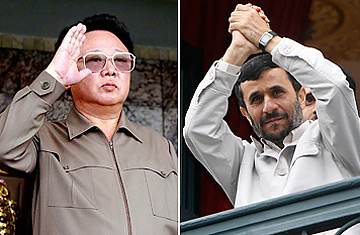
Kim Jong Il (left) and Mahmoud Ahmadinejad
In a deal welcomed by President Bush on Wednesday, North Korea has agreed to the internationally supervised dismantling of its nuclear program. It's certainly a foreign policy triumph for the Administration, and a remarkable turnabout of a situation in which the hope for denuclearization appeared forlorn only a year ago, when North Korea tested a nuclear weapon. The latest deal, however, required a change of heart not only on the part of North Korea, but also by the Bush Administration. Persuading North Korea to put down its nukes required reversing the position Washington has adopted since the advent of the current Bush Administration, of refusing to countenance security guarantees for a regime famously "loathed" by President Bush, and insisting that Pyongyang not be rewarded for behaving badly.
In the deal, brokered by China, the price for North Korea's denuclearization is the U.S. taking regime change off the table and offering security guarantees and the phased normalization of economic and political relations with a regime currently on the U.S. list of nations sponsoring terrorism. Kim Jong Il's odious regime will thus survive (unless or until it collapses under its own weight) as the price for making the region considerably safer. A compromise, then, but as many diplomatic observers had long warned, the only deal possible to avoid confrontation.
The obvious next question is this: If Washington was prepared to compromise to achieve a deal on North Korea, then why not on Iran? Speaking Wednesday in Lancaster, Pa., President Bush indicated that he would, in fact, be willing to talk with Iran if it suspended uranium enrichment. But not otherwise. That, of course, is simply a restatement of a longstanding Administration position. But its hopes of reversing Iran's nuclear program on the basis of current policies remains remote. U.N. sanctions adopted until now have failed to force Iran to suspend uranium enrichment, and new moves by Tehran to cooperate with the International Atomic Energy Agency — though falling far short of the demand by the U.S. and its allies for an end to enrichment — have postponed discussion of further sanctions. The option of military strikes to stop Iran's nuclear activities, while kept "on the table" by the Administration — and loudly championed by its more hawkish associates — remains prohibitive in light of the uncertain prospects of success and the backlash it would trigger. And many old diplomatic hands in Washington and in allied capitals have long argued that the matter can only be settled by a "grand bargain" of the sort now in process with North Korea.
Still, the Iran standoff is unlikely to be resolved any time soon by a compromise similar to the one on North Korea, because of the substantial differences between the two cases. These include:
If both sides take the steps necessary to avoid another potentially catastrophic war in the Middle East, they will almost certainly be forced, eventually, into a deal not unlike the one achieved with North Korea. But given the different factors in play on Iran, that's a very big "if."
